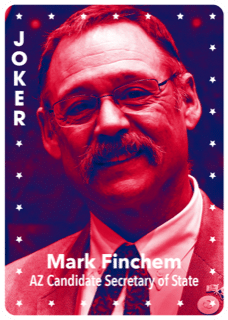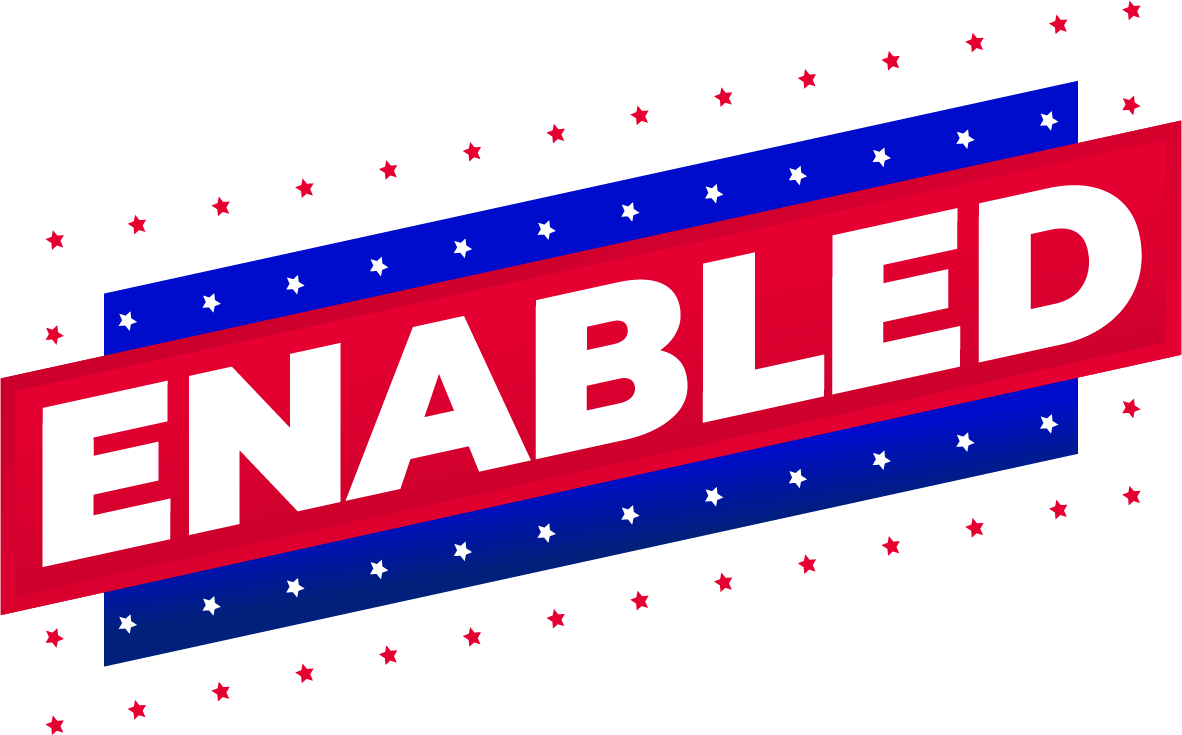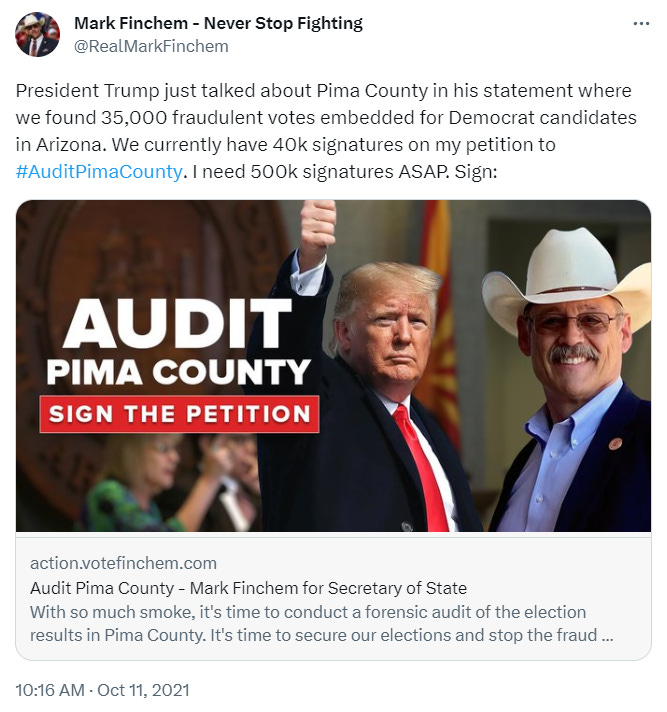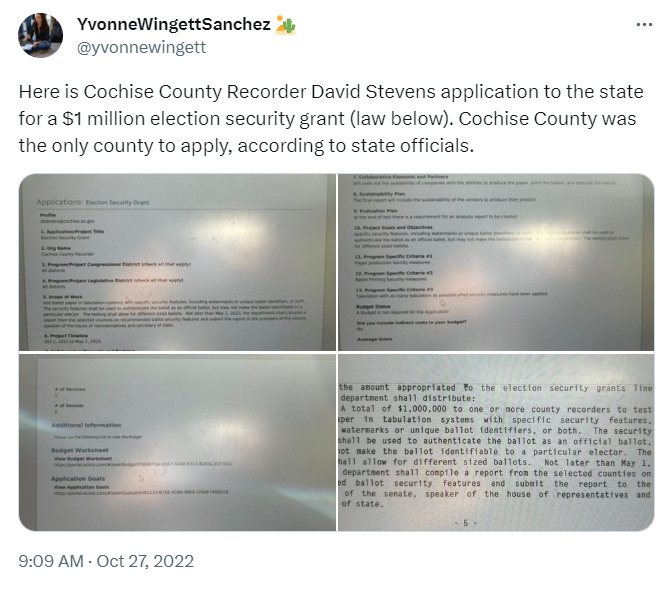
“If you care about the survival of our republic, we cannot give people power who will not honor elections.”
– Liz Cheney
AZ State Rep. and candidate for AZ Secretary of State Mark Finchem fits the bill – he is clearly someone to whom power should not be given. Read on:
- Finchem supported the “Stop the Steal” movement, which falsely claimed that Donald Trump won the election nationally and in Arizona,)
- called for the Arizona legislature to appoint presidential electors of its own choosing,
- was one of the chief proponents of the discredited post-election ballot review in Arizona, and
- has been endorsed by Trump in his bid for secretary of state, and in that capacity would be responsible for the integrity of Arizona elections and for certifying (or not) the 2024 presidential election.
- It has also been reported that a business affiliated with Finchem, Mark Finchem PLLC [sic], received $6,037 from the Trump reelection campaign. Finchem [unhelpfully] said the payment was for security costs related to his meeting with Rudy Giuliani, Trump’s disbarred enabler-in-chief of the “Stop the Steal” movement.
Arizona Agenda
Rinos talk about getting Trumped
NICOLE LUDDEN AND HANK STEPHENSON
August 8, 2024
Longtime Republican lawmakers David Cook and Ken Bennett don’t blame the voters for ousting them in last week’s election.
Instead, they blame their opponents’ massive war chests and Trumpian untruths.
“I think in today's political climate, if you have a Trump endorsement and a strong Republican district like this, if you have lots of money and you're willing to tell a bunch of untruths about your opponent, you can win an election,” Bennett told us.
Moderate vs. MAGA match-ups were one of the main focal points of the Republican primary election this year. And for the most part, the MAGAs won.
Trump-endorsed candidates Mark Finchem and Sen. Wendy Rogers defeated Bennett and Cook, who are both considered moderates along the ever-expanding spectrum of conservatism. Those defeats signify a shift in the Republican caucus and a thinning of the list of potential defectors when Republican-backed legislation comes up for a vote.
Bennett has represented Yavapai County off and on for decades — on school boards, as secretary of state and during two separate stints in the Legislature. But he was not shy about bucking his party. He cast votes that killed Republican bills, like banning trans kids from using school bathrooms and ensuring Arizona never issues a tax based on vehicle mileage.
That was enough to earn a challenge from Finchem, who received Trump’s endorsement for his particular band of election denialism.
“If you're not 100% with them, you are the enemy, and they’re gonna take you out. And that's what they did in my case,” Bennett said.
Finchem and Rogers don’t have clear roots in their districts. Rogers has long fought against claims she doesn’t live in Flagstaff, which were recently renewed when she listed a Tempe address on her campaign finance report. Finchem recently moved to Prescott to challenge Bennett.
And both have ties to the far-right Oath Keepers, a group known for outlandish conspiracies and white supremacy rhetoric.
And those extremist ties are a big part of why Cook, who has spent the last eight years representing his northern Arizona district, challenged Rogers, who has built a reputation as one of the most racist, radical lawmakers in the state.
But neither moderate could keep up with the massive fundraising hauls that the Trump-endorsed lawmakers could pull, they noted. Finchem raised more than double Bennett’s $95,000. And Cook brought in about $162,000 compared to Rogers’ $836,000.
“Supreme Court rejects Kari Lake, Mark Finchem in machine voting lawsuit, ending legal challenge”
Arizona Republic. No surprise: “Legal experts had predicted the court would not exercise its discretion to add the case to its docket, citing well-established legal precedent and the court’s low acceptance rate.” Moreover:
“U.S. District Judge John Tuchi dismissed their claims and what he called their “frivolous complaint” in Aug. 2022, saying they did not have standing — a legal precedent that requires an individual who files a case is directly impacted by the conduct they are suing over. Tuchi later ordered their legal team to pay six figures in sanctions to deter “similarly baseless suits in the future.”
“The 9th U.S. Circuit Court of Appeals in October upheld Tuchi’s ruling and agreed the case rested on hypotheticals. The case was funded by Mike Lindell, founder of MyPillow and a fervent ally of Trump who promotes false claims that elections are rigged.”
A Trump ally is ready to come clean on Georgia’s fake electors. You listening, Kris Mayes?
Opinion: Prosecutors in Georgia and Michigan are putting the screws to their fake electors and election schemers. AG Kris Mayes should follow their lead.
A key figure in the fake elector scheme took a plea deal in Georgia on Friday, agreeing to come clean about his part in the conspiracy to try to overturn the results of the 2020 presidential election.
Are you seeing this, Attorney General Kris Mayes?
Trump-aligned lawyer Kenneth Chesebro wrote memos detailing how Republicans could send false slates of presidential electors to Congress in an attempt to give Donald Trump the win or at least delay the Jan. 6, 2021, certification of Joe Biden’s victory.
According to his Fulton County, Ga., indictment, one of his memos “provides detailed, state-specific instructions for how Trump presidential elector nominees in Georgia, Arizona, Michigan, Nevada, Pennsylvania, and Wisconsin would meet and cast electoral votes” for Trump, even though he lost the election in those states.
Chesebro, who is pleading guilty to conspiracy to commit filing false documents, on Friday agreed to testify at any future trials of his fellow co-conspirators. He also agreed to turn over all emails and text messages to the district attorney’s office.
What does Chesebro know about Arizona?
[Boldface added]Have got your plane ticket to Atlanta yet, AG Mayes?
It might be interesting to see what light Chesebro can shed on Arizona’s 11 fake electors.
Specifically, how they came to be meeting at state Republican Party headquarters on Dec. 14, 2020, signing documents falsely claiming to be “duly elected and qualified” to cast Arizona’s electoral votes for the guy who didn’t win.
How these “patriots” — including two who are now state senators (Jake Hoffman and Anthony Kern), the now-former chairwoman of the Arizona Republican Party (Kelli Ward) and a top executive with Turning Point USA (Tyler Bowyer) — came up with the same wild idea that just coincidentally occurred to Republicans in six other swing states won by Biden.
Or how, even as those phonies were meeting in Phoenix to cast their non-existent votes for Trump, across town a group of Republican legislators were signing a letter to Vice President Mike Pence and Congress urging them to accept those “alternate” electoral votes.
Or how then-Rep. Mark Finchem, one of the state’s loudest stop the stealers, hand carried the lawmakers’ request to Washington on Jan. 5, 2021, putting it into the hands of one of Trump’s strongest acolytes on Capitol Hill, Rep. Andy Biggs.
Or how Biggs, along with Reps. Paul Gosar and Debbie Lesko, then voted the next day to reject Arizona’s legitimate electoral votes.
[Boldface added]Where does Mayes’ investigation’ stand?
This wasn’t just 11 local Arizona rubes who decided on a whim to protest Biden’s win by casting a symbolic electoral vote for Trump.
This was a carefully planned scheme, meticulously coordinated — from the seeds of doubt deeply planted to erode trust in our elections to the fake electors who were part of a plot to steal the vote in Arizona and other swing states to the storming of the nation’s Capitol to stop Joe Biden from becoming president.
And certain Arizonans appear to be in on it up to their eyeballs.
Fake electors:Had a cast of characters helping them
Wouldn’t it be nice to hear what Chesebro might know about that?
Mayes vowed during last year’s campaign to investigate Arizona’s fake electors. She reportedly assigned a team of prosecutors to the investigation in May. Dan Barr, Mayes’s chief deputy, in July told the Washington Post the investigation was in the “fact-gathering” phase.Since then, we’ve heard nothing.
Michigan is bringing charges. What about us?
Meanwhile, in Michigan, one of that state’s 16 fake electors this week agreed to testify against his fellow phonies in return for dismissal of eight felony counts, including forgery and conspiracy to publish a false statement.
The Michigan 16, just like the Arizona 11, met at their state GOP headquarters and signed documents stating they were the state’s “duly elected and qualified electors.”
“That was a lie … and each of the defendants knew it,” Michigan prosecutors said, in their charging documents.
The Michigan fake elector whose charges were dismissed has agreed to “cooperate fully” with the AG’s office, agreeing to testify at trial and key hearings and provide investigators with “any and all relevant documents.”
Michigan in July became the first state to bring charges against the fake electors.
It shouldn’t be the last.
Simply put, Arizona’s fake electors and their co-conspirators tried to steal our vote.
There should be a penalty for that.
AG Mayes, I hear Atlanta is nice this time of year.
But the plan was thwarted, at least temporarily, by county supervisors, who noted Stevens hadn’t followed protocol or met conditions of the grant that was seemingly designed just for him and forthe company that would create the ballots, as the Washington Post detailed earlier this year. (However, two companies ultimately bid on the project: Authentix, which has no experience in elections, and the California-based Pro Vote Solutions, which does have experience in electionsand appears to be cheaper.)
The Republican-controlled board was surprised to learn yesterday that Stevens had already spent some of the funds, considering they didn’t approve the spending and the request for proposal specifically says they must approve all vendors. And they questioned whether the grant funds were even still available, as the project was supposed to be completed more than two months ago, per the special budget provision lawmakers wrote. Stevens assured them that he had spoken with an unnamed person at the Legislature who said the delay — which Stevens pinned on the company’s inability to purchase paper — was no problem.
But supervisors were not convinced. They postponed the decision of whether to enter into contracts for two weeks, saying Stevens will have to show them the grant is still available.
“I haven’t seen anything in writing that (the deadline) has been extended. Word of mouth doesn’t count,” Supervisor Ann English said.
But the plan that supervisors temporarily foiledhas been a long time in the making, and Stevens isn’t likely to give up so easily.
After the Covid-friendly Authentix blacklight presentation in the House basement, Finchem and friends sponsored legislation attempting to mandate the state switch to the new prototype ballots by Authentix, despite pleas from elections officials who cautioned the whole idea was half-baked.
Adopting the new “counterfeit-proof” ballot paper would require not only new tabulation machines, but also a way to test as many as 19 anti-counterfeit markings on the ballots, which counties do not have, they warned. Experts debatejust how secure the ballots would be, and they are quick to note that counterfeit ballots are not a thing anyway.
The bill to mandate using the far more expensive counterfeit-proof ballots ultimately failed. But Finchem and crew managed to slip a $12 million appropriation into the FY2022 state budget to open the door for Authentix. The “Election Integrity Fund” they set up was originally set to pay for things like the kind of post-election hand recounts that Cochise and others have attempted to do. The next year, lawmakers diverted $1 million of that money to “one or more” county recorders to test new counterfeit-proof ballots.
Stevens is an affable, low-key inside player for the Stop the Steal movement who has helped push the county further into election skepticism. He and Finchem are old friends and Stevens serves as the director of Finchem’s nebulous election integrity nonprofit. Since Finchem failed to win his race for secretary of state, the Cochise County crew — including Stevens, the county’s Republican supervisors and new election-conspiracy-spreading elections directorBob Bartelsmeyer — represent the Stop the Steal movement’s beachhead into election administration in Arizona.
This is the same group of great minds who attempted to not certify the 2022 election, then attempted to conduct a full hand recount of the county’s election until a judge shot them down. The county is still appealing.
But the truth is, we don’t see anything wrong with adding additional security measures to ballots — except, of course, that the whole goal of the people pushing for it is to reinforce the erroneous belief that counterfeit ballots are a problem and then fundraise off of it. Other states require watermarks and other money-like anti-counterfeit features, and Arizona could too.
However, as far as we’re concerned, any project that involves Finchem, Stevens and their hand-picked vendor has zero credibility and deserves detailed financial scrutiny. The board of supervisors made the responsible decision, for once, in questioning and postponing the contract. They should continue their good-judgment streak and pull the plug on this project entirely.
“‘Furthering false narratives’: Lake, Finchem lawsuit draws sanction order from judge”
In a blistering 30-page opinion, a federal judge ordered sanctions against the attorneys of Kari Lake and Mark Finchem in their lawsuit against voting machines, hoping to deter “similarly baseless suits in the future.”
Lake and Finchem, Trump-endorsed Republicans who failed in their bids for governor and secretary of state, filed suit in April in an attempt to block Maricopa and Pima counties from using any electronic device to cast or count votes. They asked the court to order the counties to require paper ballots and conduct a hand count of all the ballots cast.
U.S. District Court Judge John Tuchi dismissed the suit in August, calling it full of “conjectural allegations of potential injuries.”
Before the dismissal, the five members of the Republican-dominated Maricopa County Board of Supervisors — the defendants in the case — had asked for sanctions for the “numerous false allegations about Arizona elections” the candidates and their attorneys made in their federal complaint.
Election denier Finchem defeated in Arizona secretary of state race
BY JULIA SHAPERO
11/11/22
https://thehill.com/homenews/campaign/3731975
The Associated Press called the race on Friday night, soon after projecting a win for incumbent Sen. Mark Kelly (D) in the Grand Canyon State.
Finchem frequently echoed former President Trump’s unfounded claims of election fraud, making them a central focus of his campaign to be Arizona’s top election official.
The Republican candidate, who was endorsed by Trump, was also seen outside the Capitol during the Jan. 6, 2021, riot in footage uncovered in June of that year.
Finchem was one of several election deniers vying for secretary of state roles across the country, leading to concerns about potential impacts on the 2024 election. Another election denier, Kristina Karamo, also lost in her bid to be Michigan’s secretary of state.
Election Denier Mark Finchem Projected to Lose AZ Secretary of State Race to Adrian Fontes
Adrian Fontes wasn’t popping the champagne corks just yet.
Minutes after being projected as the winner of Arizona’s secretary of state race on Friday night, he said he accepted the conclusion as ‘the media’s best estimation.”
But he was quick to add that the official determination will be made when all of the votes are properly and fully counted, a process that could take another week or so.
“I meant it when I said I respect the process,” a measured Fontes said minutes after being named the unofficial winner by The Associated Press, NBC News and CNN.
A Democrat and former Maricopa County recorder, Fontes built his campaign around a defense of the state’s electoral system, which he said has withstood the “Big Lie” that the 2020 election was stolen from Donald Trump. He oversaw the 2020 election in Arizona’s largest county, which became the epicenter of conspiracy theories that the vote was rigged to hand Joe Biden the win.
His campaign was a sharp contrast to that of Republican Mark Finchem, a Trump-endorsed candidate who has denied the results of the 2020 election and suggested that he would not accept the results of the secretary of state race if he found the “slightest suggestion of impropriety.”
On Friday, Finchem wrote on social media that “the media does not decide elections, the voters do.”
Fontes said he will wait for the voters’ official decision, but expressed optimism in a positive outcome for his campaign.
“I hope this projection sticks and I plan to be a solid secretary of state for every Arizonan, not just for those who share my party affiliation,” Fontes said in a brief interview.
“Election denier Mark Finchem’s sleeper campaign closes in on MAGA prize; The Oath Keeper hoping to run Arizona’s elections is getting outspent 40 to 1 and makes few press or campaign appearances. He still might pull it off.”
It’s 2024. Trump Backers Won’t Certify the Election. What Next, Legally?
The question is most urgent in Arizona, where two of the former president’s loyalists may well become governor and secretary of state.
The Times On Politics newsletter, a guide to the political news in Washington and across the nation
It’s a nightmare scenario for American democracy: The officials in charge of certifying an election refuse to do so, setting off a blizzard of litigation and possibly a constitutional crisis.
And there are worrying signs that the fears of independent scholars, Democrats and a few anti-Trump Republicans could become a reality. We could soon be in legal terra incognita, they said — like the days when medieval cartographers would write “Here Be Dragons” along the unexplored edges of world maps.
“It would be completely unprecedented,” said Nathaniel Persily, an elections expert at Stanford University. “I hate to be apocalyptic,” he added, but the United States could be headed for the kind of electoral chaos that “our system is incapable of handling.”
In Arizona, Kari Lake, a charismatic former television anchor, and Mark Finchem, a state lawmaker, have a very good chance of becoming governor and secretary of state. Both are ardent supporters of Donald Trump and his false claims that the 2020 election was stolen.
On Friday, a group sponsored by Representative Liz Cheney, the vice chairwoman of the House committee investigating the Capitol assault, put $500,000 behind a television and digital ad that underscores the alarm some anti-Trump Republicans share about Lake and Finchem.
“If you care about the survival of our republic, we cannot give people power who will not honor elections,” Cheney says in the ad. “We must have elected officials who honor that responsibility.”
Another reason for the worries about Arizona in particular: Unlike in other states where Trump has promoted election-denying candidates, several of the politicians who pushed back on his calls to overturn the 2020 results will be gone.
Gov. Doug Ducey, a Republican who resisted Trump’s efforts in 2020, is leaving office after his term is up, as is Attorney General Mark Brnovich, an ally in that opposition. Rusty Bowers, who as the Republican speaker of the State House stood with Ducey and Brnovich, lost his primary this year for a State Senate seat. And even Brnovich, who ran unsuccessfully for the U.S. Senate against another election denier, Blake Masters, has shifted his tone about the 2020 election.
“Ducey was a little bit of a moderating factor,” said Marc Elias, the Democratic Party’s leading election lawyer. But Ducey was also “willing to tolerate a lot of crazy,” Elias added.
The governor is backing Lake, as is the Republican Governors Association, actions that Sarah Longwell, a Republican strategist whose group is spending at least $3 million in Arizona opposing Lake and Finchem, called “despicable.” Longwell said that Lake was especially dangerous because of her ability to “talk normal to the normies and crazy to the crazies.”
What could happen if Lake and Finchem win?
The most worrisome scenario, several nonpartisan experts said, is that Finchem and Lake might refuse to fulfill the traditionally ceremonial act of “canvassing” the results of a presidential election under Arizona law, or that the governor could refuse to sign the required “certificate of ascertainment” that is then sent to Washington.
Elias’s firm, which has grown to nearly 80 lawyers, would then have to decide whether to sue in state or federal court, or perhaps both, depending on which path was more relevant. But he acknowledged some uncertainty about how that litigation might play out.
One new factor in 2024 may be an overhauled Electoral Count Act, which is expected to pass Congress after the midterms. It would create a new panel of three federal judges who would rule on election-related lawsuits, with appeals going directly to the Supreme Court. Proponents say the new panel would allow disputes to be adjudicated more quickly.
“It’s not actually all that easy to anoint the loser of an election the winner,” cautioned David Becker, the director of the Center for Election Innovation and Research, a nonpartisan group.
“The one exception to that is the presidential election,” Becker said, in which there’s an opportunity for a “corrupt individual” to send a slate of electors to Washington that does not reflect the will of voters. If the national Electoral College results were close, a protracted dispute in Arizona could hamper Congress from rapidly determining the overall winner.
But Becker said he was more worried about the prospect for political violence fueled by uncertainty than he was about the integrity of the legal system.
Neither Lake nor Finchem responded to questions. Finchem has said he would certify the next election “as long as all lawful votes are counted and all votes cast are under the law,” while failing to specify what he means by “lawful.” Finchem has also said that he couldn’t imagine President Biden winning.
The power of a secretary of state
Secretaries of state also have enormous power over elections, though it’s county officials that actually run them.
To take just one recent example: Finchem and Lake both support a return to hand-counting ballots, which election experts say would introduce more errors and uncertainty into the process.
One rural Arizona county controlled by Republicans, Cochise County, initially planned to count every vote in the midterms by hand — only to back down when Katie Hobbs, the Democratic secretary of state who is running for governor against Lake, threatened to sue.
In neighboring Nevada, another G.O.P.-controlled county’s plan to count ballots by hand is on hold after the State Supreme Court ruled the process illegal. The Republican secretary of state, Barbara Cegavske, then ordered the hand-counting process to “cease immediately.” Her possible successor, the Trump-backed Jim Marchant, might have acted differently.
One of the Arizona secretary of state’s chief tasks is assembling the elections procedures manual that, once approved by the governor and the attorney general, is distributed to county and local officials. Brnovich refused to accept the 2021 manual proposed by Hobbs, so the state has been using the 2019 edition.
The manual is limited to the confines of Arizona election law. But Finchem could tinker with the rules regarding the approval of voter registration, or ballot drop boxes, in ways that subtly favor Republicans, said Jim Barton, an election lawyer in Arizona. He could also adjust the certification procedure for presidential elections.
“You can imagine a lot of mischief with all the nitty-gritty stuff that nobody pays attention to,” said Richard Hasen, an elections expert at the University of California, Los Angeles.
Looming over all this is a Supreme Court case on elections that is heading to oral arguments this fall.
The justices are expected to rule on a previously obscure legal theory called the independent state legislature doctrine. Conservatives argue that the Constitution granted state legislatures, rather than secretaries of state or courts, the full authority to determine how federal elections are carried out; liberals and many legal scholars say that’s nonsense.
If the court adopts the most aggressive version of the legal theory, Persily noted, it could raise questions about the constitutionality of the Electoral Count Act, adding a new wrinkle of uncertainty.
“My hair is on fire” to an even greater degree than it was in 2020, said Hasen, who published a prescient book that year called “Election Meltdown.”
“Arizona GOP secretary of state nominee stands by election conspiracy theories in debate”
CNN:
Arizona Republican secretary of state nominee Mark Finchem doubled down on the conspiracy theories that he has espoused about the 2020 presidential election in a debate against Democrat Adrian Fontes Thursday night, asserting that the votes in several key Arizona counties should have been “set aside” even though there was no evidence of widespread voter fraud in the 2020 contest.
“There are certain counties that should have been set aside as irredeemably compromised — Maricopa County was one of them. Yuma County was one of them,” the Republican state lawmaker said, echoing claims he made in a February resolution that called for decertifying the 2020 election results in three Arizona counties — even though legal experts say there is no legal mechanism to do so. “We have so many votes outside of the law that it begs the question, what do we do with an election where we have votes that are in the stream, which should not be counted?”
Finchem, a Republican state representative in Arizona, was endorsed by Donald Trump in September of 2021 after becoming one of the most vocal supporters of the former President’s lies about the 2020 presidential election. Trump is supporting a broad array of election deniers vying for office in November as he continues his unrelenting campaign to undermine and subvert the 2020 results.
Finchem is one of at least 11 Republican nominees running for state elections chief who have questioned, rejected or tried to overturn the results of the 2020 election, as CNN’s Daniel Dale chronicled last month — a trend that has alarmed election experts and increasingly drawn the notice of the public.
The battle over ‘the big lie’
This November, voters will decide the future of American elections. Arizona is ground zero
Political machines of the past have dominated elections in certain American cities for periods of time, doling out patronage and making local deals to hold onto the levers of power; think Tammany Hall in 19th century New York or the Chicago Democratic machine for most of the 1900s. But today’s movement to seize control of national elections is unprecedented in scope, and perhaps more reminiscent of the maneuvers used by democratically elected strongmen in countries like Hungary, whose authoritarian president, Viktor Orban, headlined the recent CPAC conference.
“We haven’t had to worry before, at least in modern American history, that election administrators might not run elections fairly, and might try to subvert the results to benefit one side or another,” says Rick Hasen, director of UCLA’s Safeguarding Democracy Project and one of the country’s foremost experts on election law. “But that’s now a real threat that’s on the table. And we’re gonna have to figure out how to address it.”
The strategy is reshaping state and local campaigns in curious ways. Beyond prominent offices like governors and legislators — whose influence is a little more obvious — certain down-ballot races are drawing a higher profile than ever, precisely because they play a role in election integrity. And because the emphasis is on loyalty to the former president, some candidates have resumes that might seem surprising.
A campaign ad for the Republican candidate for Arizona secretary of state offers an interesting case study. On screen, he slides on a white cowboy hat — posturing as a man of action — over wire-framed glasses and a bushy mustache. Ads are rare this far down the ballot, but this man is lucky enough to let a former president speak for him. “He is tough as hell,” Trump says. “Mark Finchem had the courage to hold the hearings that led to the Arizona audit,” a voiceover artist adds. “Mark Finchem is the election integrity fighter we need, now.”
A member of the Arizona House since 2015, Finchem is also a member of Oath Keepers, a nationwide militia. As of this writing, that group’s leader and seven other members were awaiting trial in federal court on seditious conspiracy charges, among others, for their alleged role in the insurrection of January 6, 2021. At least three more had already pleaded guilty. Prosecutors say the group kept a “death list” of officials who oversaw the Georgia elections in 2020, which Trump lost, and brought explosives to Washington, D.C., for potential use during the uprising. Finchem was there, too, photographed among the mob at the Capitol steps and tweeting a photo of his own. That same month, he posted a “treason watch list” on his Pinterest account featuring Barack Obama, Janet Napolitano and other prominent Democrats. On his website, a banner declares: “Sign the petition to decertify and set aside AZ electors.”
The Arizona Republican Party’s Anti-Democratic Experience
First, it turned against the establishment. Now it has set its sights on democracy – the principles, the process and even the word itself.
By Robert Draper
August 15, 2022
https://www.nytimes.com/2022/08/15/magazine/arizona-republicans-democracy
[Excerpt:]Read More
The Bannon Strategy (Steve Bannon’s Man in Arizona)
Fringe candidates promising to stop the steal, like Mark Finchem in Arizona, might just have their year.
“Democracy is contagious. It is an attractive idea because it is the people, not autocrats, who decide who runs the country and in which direction to move.”


 Laurie Roberts
Laurie Roberts
